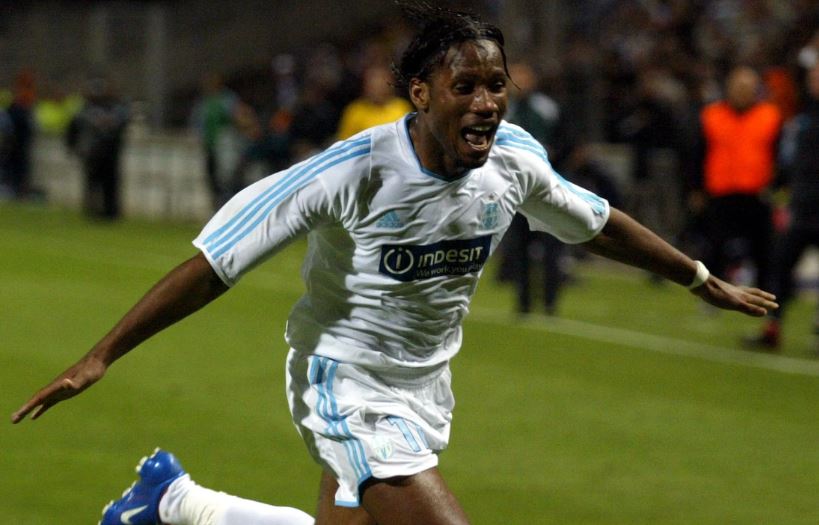This guide presents a definitive ranking of the top 10 African footballers to have played in Ligue 1. It considers a player’s overall impact on the game, including goalscoring prowess, technical ability, and influence on their teams’ success.
Who Are The Top 10 Best African Players In Ligue 1 History?
Here are the top 10 finest African footballers In Ligue 1 history:
1. Didier Drogba

Didier Drogba is one of the top African players to have ever played in Ligue 1. His time in French football started halfway through the 2001-02 season when Guingamp, a Ligue 1 club, decided to sign him from Le Mans for a fee of £80,000.
During the second half of that season, Drogba played in 11 matches and scored three goals. These goals were crucial in helping Guingamp avoid relegation, but the coaching staff was still unsure about his potential.
The following season, Drogba proved his worth. He scored 17 goals in 34 appearances, leading Guingamp to finish in seventh place, their highest league position ever.
Drogba credited his teammates for his success, especially Florent Malouda, a long-time friend and winger, who played a major role in Drogba’s goalscoring run.
Drogba’s impressive performance attracted attention from bigger clubs, and by the end of the season, he was signed by Olympique de Marseille for £3.3 million.
At Marseille, Drogba impressed. Despite a change in coaches, he maintained his position in the team, scoring 19 goals and earning the National Union of Professional Footballers (UNFP) Player of the Year award.
He also performed well in European competitions, scoring five goals in the UEFA Champions League and six in the UEFA Cup.
Drogba’s exceptional season at Marseille led to a record-breaking transfer to Chelsea for £24 million. His legacy at Marseille is so important that his shirt from his only season there is framed and displayed in the basilica of Marseille, Notre-Dame de la Garde, which he gifted to the church before the 2004 UEFA Cup Final.
2. Jay Jay Okocha
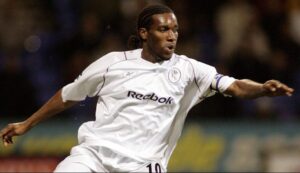
One of the top 10 best African players in Ligue 1 history is Jay-Jay Okocha. Born in Nigeria, Okocha was known for his incredible dribbling skills, creativity, and flair on the pitch.
In 1998, Paris Saint-Germain (PSG), one of the biggest football clubs in France, signed Okocha for around £14 million.
At the time, this transfer made him the most expensive African player ever. Okocha’s time at PSG lasted from 1998 to 2002.
During these four years, he played in 84 matches and scored 12 goals. While his goal tally might not seem very high, Okocha’s impact on the game was immense.
He was known for his ability to entertain the crowd with his fancy footwork and amazing skills. Fans loved watching him play because he brought a lot of excitement and joy to the game.
One of the highlights of Okocha’s career at PSG was his role as a mentor to a young Brazilian player named Ronaldinho.
Ronaldinho, who would later win the prestigious Ballon d’Or award, learned a lot from Okocha during their time together in Paris.
Okocha’s experience and guidance helped Ronaldinho develop into one of the best footballers in the world. In 2001, Okocha also contributed to PSG’s success in the UEFA Intertoto Cup.
He scored five goals in the tournament, helping PSG win the cup alongside Aston Villa and ES Troyes AC. This victory was a proud moment for the club and for Okocha himself.
3. Geoge Weah
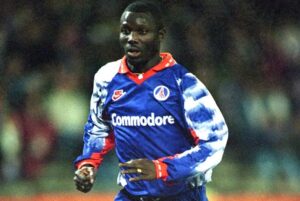
George Weah is one of the best African players in Ligue 1 history. His talent was first noticed by Claude Le Roy, the manager of the Cameroon national team.
Le Roy recommended Weah to Arsène Wenger, who was the manager of the French club Monaco. Wenger flew to Africa to see Weah play and soon after, in 1988, Weah signed with Monaco for a transfer fee of £12,000.
Weah has always credited Wenger for being a big influence on his career. During his time at Monaco, Weah’s skills were exceptional.
In 1989, he was named the African Footballer of the Year for the first time, which was his first major award. He took this award back to his home country, where the entire nation celebrated his success.
In the 1990–91 season, Weah helped Monaco win the Coupe de France, scoring in the final to secure a 1–0 victory over Marseille.
He also played an important role in Monaco’s journey to the final of the 1991–92 European Cup Winners’ Cup, scoring four goals in nine appearances.
Weah then moved to Paris Saint-Germain (PSG) in 1992 and played there until 1995. His time at PSG was very successful.
He won the Coupe de France in 1993 and 1995, the Division 1 title in 1994, and the Coupe de la Ligue in 1995. During the 1994–95 UEFA Champions League season,
Weah was the top scorer with seven goals, including a memorable goal against Bayern Munich in the group stage.
PSG reached the semi-finals of the UEFA Champions League that season, due to Weah’s efforts. In his time with PSG, Weah also reached the semi-finals of the 1992–93 UEFA Cup and the 1993–94 European Cup Winners’ Cup.
Overall, he scored 16 goals in 25 European matches for the club. In 1994, Weah was named African Footballer of the Year for the second time.
His exceptional performances and numerous achievements make George Weah one of the greatest African players in Ligue 1 history.
4. Jean-Marc Adjovi Boco
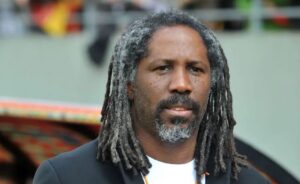
Jean-Marc Adjovi-Boco is a retired Beninese professional footballer who played as a defender. He is well-remembered for his contributions both in France and for the Benin national team, where he served as captain until his international retirement in the summer of 1997.
Adjovi-Boco’s professional career in Ligue 1 started when he joined Amiens in the 1986-1987 season. Although he did not score any goals, his defensive skills were incredible as he played 22 matches.
The following season, he moved to FC Rouen, appearing in 28 games without scoring but continuing to develop as a solid defender.
His most significant period was when he joined Tours in 1988, where he played 93 matches over three years. His performances caught the eye of RC Lens, one of the more prominent teams in Ligue 1.
Adjovi-Boco spent six successful years at Lens from 1991 to 1997, playing 195 matches. Even though he never scored a goal, his reliability and leadership on the field were invaluable.
5. Roger Milla
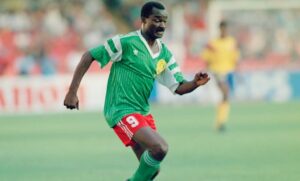
Roger Milla is one of the greatest African players to have ever graced Ligue 1. He moved to France at the age of 25 in 1977 and spent 12 years playing for various French clubs.
His career in France began when he joined Valenciennes in 1977. During his two seasons with Valenciennes, he scored 6 goals in 28 league games.
In 1979, Milla moved to AS Monaco. His time at Monaco was highlighted by winning the French Cup in 1980. However, he faced multiple injuries, which affected his performance.
Despite this, he managed to score 5 goals in 25 league and cup games. Due to his injuries, Monaco decided to release him at the end of the season.
Milla’s next club was Bastia, and he played from 1980 to 1984. He had a successful stint at Bastia, scoring 42 goals in 133 competitive matches.
His contributions were crucial in helping the team win the French Cup in 1981. In 1984, Roger Milla joined Saint-Etienne, a club that was recovering from a bribery scandal and subsequent relegation.
Milla played a big part in the club’s revival, scoring 36 goals in 69 matches. His efforts helped Saint-Etienne return to the first division.
Milla’s final French club was Montpellier, where he played from 1986 to 1989. In his first season, he scored an impressive 18 goals in 33 matches, helping Montpellier secure promotion to Division 1.
Over his time at Montpellier, he scored 41 goals in 103 appearances. After retiring, he joined Montpellier’s coaching staff, continuing his connection with the club.
You can tell that Roger Milla’s impact on Ligue 1 is undeniable. His career through different French clubs and his consistent goal-scoring ability made him a standout player.
6. Abedi Ayew
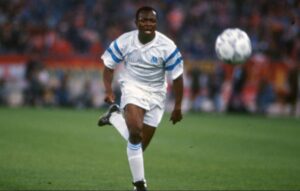
Abedi Pele is widely regarded as one of the best African players in Ligue 1 history. His journey in European football started with the French team Chamois Niort.
After that, he moved to Marseille, where he became a key figure in French football. Abedi was loaned to Lille for a brief period before joining Lyon.
At Marseille, Abedi Pele was instrumental in the team’s success. He helped Marseille win four league championships and reach two European Cup finals.
During his time at Marseille, he played alongside Jean-Pierre Papin and Chris Waddle, forming a trio known as the “Magical Trio.”
This trio was important in making Marseille one of the strongest teams in Europe in the early 1990s. In 1991, Marseille reached the European Cup final but lost.
However, Abedi Pele was the only member of the “Magical Trio” still with the team when Marseille won the 1993 Champions League final against Milan in Munich. After his successful spell with Marseille, Abedi Pele joined Lyon.
7. Joseph Antoine Bell
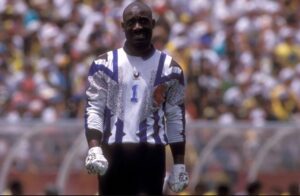
Joseph Antoine Bell is undoubtedly one of the finest African players in Ligue 1 history. His career in France began when he was already 31 years old.
Before arriving in France, Bell played for Al-Mokawloon al-Arab in Egypt from 1983 to 1985. Bell’s journey in Ligue 1 started with Olympique de Marseille in 1985.
Despite joining the club at an age when many players consider retirement, he proved his worth immediately. Over three seasons at Marseille, he consistently performed at a high level, playing 36, 38, and 35 league matches each season.
His reliability and exceptional goalkeeping helped firm Marseille’s defense during his tenure. After leaving Marseille in 1988, Bell joined Sporting Toulon Var for the 1988-1989 season.
Even though he spent just one season with Toulon, he made a great impact, playing 31 matches. His performances continued to impress, showing that age was just a number for this talented goalkeeper.
Bell then moved to FC Girondins de Bordeaux, where he played for two seasons from 1989 to 1991. During his time at Bordeaux, he maintained his consistent form, playing 38 matches in his first season and 37 in his second.
His presence between the posts was a good factor for Bordeaux’s defensive stability. The final chapter of Bell’s playing career was with AS Saint-Étienne, from 1991 to 1994.
Even in his later years, Bell demonstrated his enduring class and skill. He played 35 matches in the 1991-1992 season, 38 matches in 1992-1993, and 26 matches in his final season, 1993-1994.
8. Mamadou Niang
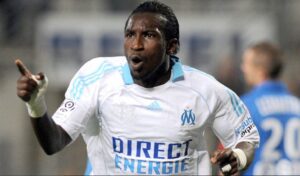
Mamadou Niang began his football career with the Le Havre youth team before turning professional at 18 with Troyes.
His early career had its ups and downs. In his first season, he made ten appearances in Ligue 1, all as a substitute.
The following season wasn’t much better, with only 17 starts and three league goals. A loan to FC Metz in Ligue 2 was a turning point for Niang.
He scored five goals in 12 appearances, helping Metz earn promotion back to Ligue 1 for the 2003-04 season. Metz’s manager, Jean Fernandez, wanted to sign Niang permanently, but the deal didn’t go through.
Instead, Niang moved to Strasbourg. At Strasbourg, Niang initially formed a strong strike partnership with Danijel Ljuboja until Ljuboja moved to Paris Saint-Germain.
After that, Niang didn’t score for the rest of the season. However, the arrival of Mickaël Pagis for the 2004-05 season changed things.
Niang and Pagis scored 27 goals together in the league, leading Strasbourg to the Coupe de la Ligue final, where they won against Caen.
He scored the first goal in the 2-1 victory, earning Strasbourg their second Coupe de la Ligue trophy. In 2005, Niang transferred to Marseille for €7 million.
Six months later, Pagis joined him. Niang ended the season as Marseille’s top scorer with ten goals, though they lost the Coupe de France final to Paris Saint-Germain.
In May 2008, Marseille fans voted Niang as their player of the month. He had an exceptional 2009-10 season, finishing as the top scorer in Ligue 1 with 18 goals. Niang also ended the season as Marseille’s highest scorer with 28 goals in all competitions.
9. Michael Essien
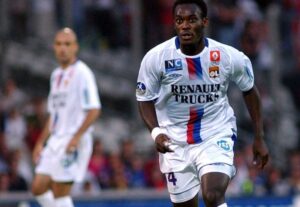
One of the top African players in Ligue 1 history is Michael Essien, having started when Paris Saint-Germain made the highest offer for him, which Bastia accepted.
However, Essien chose to join Lyon instead. Lyon paid Bastia €7.8 million for his transfer, and he was given the number 4 shirt.
Essien played as a box-to-box midfielder, helping playmaker Juninho and working with defensive midfielders Edmílson and Mahamadou Diarra to protect the defense.
Essien made his debut for Lyon in the 2003 Trophée des Champions match against Auxerre on July 27, 2003. He scored his first goal for Lyon just five minutes into the game, leading to a 2-1 victory and his first club honor.
In his third league match, Essien scored his first league goal in a 3-1 win over Monaco. Throughout the season, he played regularly, making 33 more league appearances and scoring two more goals.
On May 23, 2004, Lyon won their third consecutive league title by beating Lille 3-0, with Essien coming on as a substitute.
In the UEFA Champions League that season, Essien played in eight of Lyon’s ten matches before they were knocked out by Porto, the eventual champions.
In his final season with Lyon, he played in all but one league match and helped Lyon win their fourth straight title.
He scored three goals and received 11 yellow cards, one of the highest in the league. His excellent performances earned him the 2005 Player of the Year award from France’s National Union of Professional Footballers (UNFP).
Essien also helped Lyon reach the quarter-finals of the 2004-05 UEFA Champions League, scoring five goals. At the end of the season, he was named Ligue 1 Player of the Year, starting a streak of UNFP Player of the Year awards for Lyon players.
He was also nominated for the 2005 FIFA World Player of the Year Award, finishing 22nd. His impressive play attracted the attention of Chelsea, who eventually signed him.
10. Salif Keïta
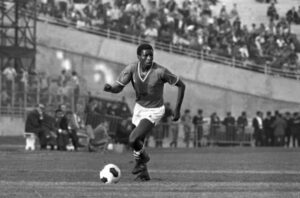
Salif Keïta is one of the top 10 best African players in Ligue 1 history. Born in Mali, Keïta made a big impact on French football after joining AS Saint-Étienne in 1967 at just 20 years old.
During his time at Saint-Étienne, he helped the team achieve great success. Keïta won three consecutive Ligue 1 titles with the club and also won the double in 1968 and 1970.
Keïta’s scoring ability was incredible. In his last two seasons with Saint-Étienne, he scored a total of 71 league goals.
Remarkably, he scored 42 goals in the 1970-71 season alone, even though the team did not win any trophies in those years. His outstanding performances on the field earned him the title of African Footballer of the Year in 1970.
After five successful years with Saint-Étienne, he scored 125 goals in 149 matches, then he moved to Olympique de Marseille in 1972.
However, his time at Marseille was short. The club wanted him to change his nationality to French, which he refused.
This disagreement led him to leave Marseille after just one season, during which he scored 10 goals in 18 matches. Keïta then joined Valencia CF in Spain.

